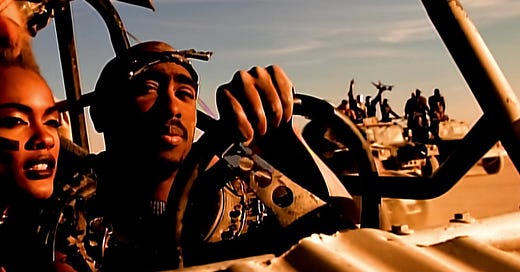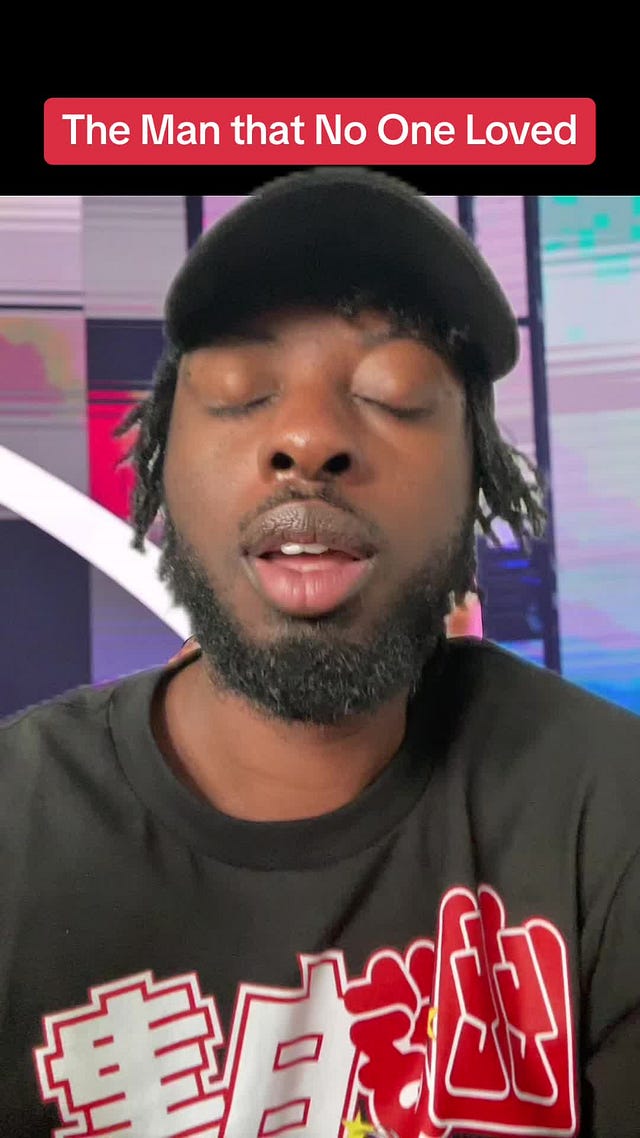I've been following the beef between rappers Kendrick Lamar and Drake for the past week. It's been enormously entertaining, but there’s also something else about it that has fascinated me in a way that I couldn't describe at first. This happens to me sometimes - the fascination comes first, and then it takes me several days to understand why I find something so interesting.
Four days ago, Kendrick released the track ‘Not Like Us’. It’s become an incredible hit, but it also crystalized for me why I can’t stop following this story - it represents how social media has changed the nature of rap feuds.
Back to the ‘90s
To understand where rap beefs are going, we need to understand where they used to be. So buckle up children, we’re going all the way back to when dinosaurs roamed the earth - the 1990s.
The ‘90s were a more violent time. The rate of violent crime in most of America was much higher in the ‘80s and ‘90s. And more than just crime, fighting and violence was just more normal as a reaction to slights. Kids got into school fights more often. When professional sports teams got mad at each other, they tended to throw punches in wild brawls. And this especially applied to the rap industry, where lyrical feuds could easily spill over into gunshots.
The era-defining events for 90s rap occurred when Tupac Shakur was shot and killed in September 1996, and then Biggie Smalls was killed in retaliation in March 1997. Arguably the two most accomplished rappers alive were killed as part of the East Coast/West Coast feud. It’s hard to overstate exactly how big a deal this was not just for rap, but for our culture at large.
But the ‘90s were the peak of violence. In the 2000s, crime rates decreased. Athletes rarely get into serious fights these days when they’re mad - they much prefer the ‘Hold me back, bro!’ method of pretending to be tough.1 And the rap industry, shaken from the deaths of two legends, stepped back as well. Violence sometimes erupts from time to time, sure. But the defining beef of the early 2000s was Jay-Z vs Nas, a feud that was eventually settled when Jay-Z’s mom made him apologize to Nas for going too far in a diss track.
This left rap in a weird place in the 2000s. Beefs that used to get you actually killed became just words - successive rounds of calling the other guy a bitch, basically. You bragged about your own toughness, your street cred, how successful and popular you are, and how your opponent had none of those things. Given the time period, there was a lot of calling each other gay. You could obviously win or lose these battles based on how clever your insults were, but fundamentally these beefs were all sizzle, no steak.
I don’t want to overstate the case - there were still occasional flare-ups of violence in the 2000s. But we never saw anything close to the scale of the Tupac/Biggie shootings again. Over time, it became common knowledge that that rap beefs were about showmanship, not violence (even if the lyrics themselves boasted about violence).
Actual Assassination to Character Assassination
That equilibrium of ‘insults that are ultimately inconsequential’ lasted for around twenty years. This was great from the standpoint of famous rappers not killing each other, but somewhat unsatisfying from a beef perspective. There are only so many rounds of “You’re a bitch” - “No, you’re a bitch. I’m street for real” - “No, I’m street, you’re fake and lame” you can take before it all feels artificial, like a musical version of kayfabe. Do these guys even dislike each other?
The first sign that things were changing was Pusha T’s 2018 diss track against Drake titled ‘The Story of Adidon’:
This is a monster of a track, and there are two notable reasons why. First, it goes after Drake in a very real-world way. It’s making claims about Drake’s character as a human being completely independent of rap or the music industry. Second, it actually breaks news of a scandal that was previously unknown to the public.
Pusha’s attacks here aren’t of the typical “I’m a real street rapper and you’re a soft fake loser”. That’s probably true in this case, but beside the point. Pusha instead goes after his real world reputation. The cover image is a never-before-seen image of Drake in blackface from his days as a teen actor.2 He then drops the absolute bombshell that Drake has been hiding a child he had with a porn star years ago. The gist of the rap is “Your father abandoned you as a child, and now you’re also a deadbeat dad, great job.” This turned out to be true and Drake was pretty much forced to acknowledge the child shortly after the song was released.
Looking back, this was a turning point for beefs. These contests have always played to the crowd, but this was different. Pusha didn’t care about winning a one-on-one contest about who was tougher, more real, etc. Pusha wanted to ruin Drake’s reputation to everyone else in the world, and he was willing to do some bizarro form of investigative reporting on Drake’s personal life to make it happen. Beefs are no longer about killing each other, and no longer about trading meaningless insults. They’re now about character assassination with the broader public.
Not Like Us
That brings us to the present day, and ‘Not Like Us’. If you need a full background on how the Kendrick/Drake beef got started, here’s a quick explainer:
Following in Pusha T’s footsteps, Kendrick goes for the jugular on his most recent song Not Like Us. Drake has long had a history of… let’s call it ‘problematic’ behavior around underage women. There have whispers and rumors around this for a while. And Kendrick’s track is essentially a public accusation that Drake is a pedophile.
Say, Drake, I hear you like 'em young
You better not ever go to cell block one
To any bitch that talk to him and they in love
Just make sure you hide your lil' sister from him…
Why you trollin' like a bitch? Ain't you tired?
Tryna strike a chord and it's probably A-minor
Just in case it wasn’t crystal clear enough, Kendrick explicitly calls him a ‘certified pedophile’. He also accuses him of being a ‘colonizer’.3 Much like Pusha, he’s going after Drake’s real-world personal reputation in the most damaging way he can think of.
But beyond going after Drake’s reputation, Kendrick and crew have realized how to utilize social media to make things even worse. Kendrick announced he was allowing monetization and removing all copyright claims for online reaction videos/analysis of his songs, allowing them to go viral through YouTube reactions and TikTok explainers. Kendrick collaborator Metro Boomin released an extremely sick beat called ‘BBL Drizzy’ without lyrics, declaring that anyone dissing Drake could use the beat for free. Predictably there are now hundreds of verses using it, and Drake’s getting cooked by SoundCloud rappers in a dozen languages.
Kendrick has won the social media battle so decisively he’s got people doing Google Maps vandalism. It’s a crushing victory in virtually every way it could be. Just hours after it was released Not Like Us was in NYC nightclubs. It’s being played on national TV and in NBA arenas. It’s not just an incredibly vicious diss track, it’s also a certified bop. The song broke Spotify’s record for the most streams any rap song has ever had in its first 24 hours.4 It’s on track to land at #1 overall on the Billboard Hot 100 next week. This song is everywhere.
Things have gotten so bad that Drake released a song, “The Heart Part 6”, where he denies that he’s a pedophile. Free PR advice: if you’ve gotten to the point where you are releasing music about how you are definitely not a child molester, you’ve already lost. Drake was literally forced into doing the Always Sunny In Philadelphia bit! But he did it for real!
Drake fans have realized how the game is played now, albeit far too late. They’ve tried digging up old tweets of Metro Boomin’s to tag him as ‘Metro Groomin’. Drake’s most recent song also included accusations that Kendrick hits women and that one of his kids was actually fathered by someone else. These accusations don’t really seem to be landing for several reasons. First, there’s actually a lot of receipts when it comes to Drake’s character flaws - he really did have that secret kid, and his creepy behavior around teens is well documented. There’s little concrete evidence in the other direction towards Kendrick. There’s also the fact that Kendrick’s social media strategy was exquisite, so his tracks are getting 10x as much attention. We’re also probably all just sick of Drake - we’ve talked before about how anyone who’s too popular for too long generates backlash.
And frankly? Not Like Us is just a banger, it might be the song of the summer. But beyond the musical quality, this is how things are now. Beefs have always been part of rap in a way that’s not like other genres, but now you need more than just clever lyricism to win your feud. You need a social media strategy. You need investigative research uncovering the other guy’s deepest darkest secrets, you need to bring receipts on the stuff that could ruin his reputation forever. And you need a plan to activate online energy to make sure people are all memeing on him instead of you.
Postscript: Immediately after I finished writing this, it was reported that one of Drake’s security guards was shot outside Drake’s home in Toronto. The most up-to-date speculation seems to be that this stems from a local Toronto dispute, and isn’t related to the Kendrick/Drake feud. But it’s a great reminder that when things get vicious and personal, there’s always a possibility someone will resort to violence.
Fights still happen from time to time, but they’ve absolutely decreased both in quantity and intensity from what used to occur.
I don’t personally fault Drake for something he was probably pressured into as an unknown teen actor. But regardless, it’s incredibly damaging to his reputation to have been caught in that kind of cartoonishly racist blackface
He also uses what appears to be a leaked picture of Drake’s Ozempic prescription as the cover art for one of his diss tracks, which is admittedly extremely funny
Ironically taking the record from Drake







Jcole with the 1000 iq dodge. BBL Drizzy BBL Drizzyyyyyy
This was a very fun high level read!
I do think you’re glossing over a bit about the other aspect of the beef - the allegations that Drake is incredibly inauthentic culture vulture and why the critique is so damning.
Drake, in many ways, is one of the first true social media superstars. Like social media, Drake’s music is an amalgamation of different styles and tropes, sometimes cartoonishly so. The core of the critique is that not only is Drake not from the culture, but he inauthentically uses it at the expense of other artists. Kendrick has both the skill and talent to make such incisive critiques while also making a bop, something that Drake just isn’t skilled enough to do. And Kendrick’s music is the complete opposite of Drake and he is significantly less overexposed, making him the perfect avatar for the critique.
Most importantly, both Kendrick and Metro Boomin have made it cool for the masses to dislike Drake, something that would’ve been almost unthinkable six months ago .